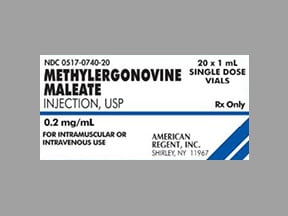
Methylergonovine Coupons & Savings Card – Discount Prices from $11.77
Generic for: Methergine
Methylergonovine, also known as Methergine, is a medication used to manage excessive bleeding in women during or after childbirth. It is part of the ergot alkaloids class of drugs and functions by enhancing the rate and strength of uterine contractions, which helps to firm up the uterus muscles and reduce bleeding. Typically, this medication is administered three to four times daily, but it should not be used for more than one week. Common side effects may include high blood pressure, stomach pain, nausea, and vomiting. Methylergonovine is available in both generic and brand name forms. Always consult with a healthcare professional before using this medication to ensure it is safe and appropriate for your individual needs.
Our coupons are free to use. Before paying, show the pharmacist your Methylergonovine savings card to get your free discount. Use our filters below to edit the prescription box to match your needs. The Methylergonovine prices will update based on your prescription needs. Above our Methylergonovine coupons, you can change your location to see pharmacy prices and costs in other areas. We're here to help you buy Methylergonovine at the lowest price with our prescription discount card.
My prescription
Edit
1ML of 0.2MG/ML, Methylergonovine (1 Ampule)
Select pharmacy

CVS
$44.38
COUPON PRICE
Albertsons
$11.77
COUPON PRICE
Walmart
$13.98
COUPON PRICE
Walgreens
$21.04
COUPON PRICEMethylergonovine savings card
Show this card to your pharmacist
Albertsons
$11.77
BIN
ID
PCN
GRP
019876
LHEA1E14F7
CHIPPO
LHX
Powered by
Methylergonovine, also known as Methergine, is a medication used to manage excessive bleeding in women during or after childbirth. It is part of the ergot alkaloids class of drugs and functions by enhancing the rate and strength of uterine contractions, which helps to firm up the uterus muscles and reduce bleeding. Typically, this medication is administered three to four times daily, but it should not be used for more than one week. Common side effects may include high blood pressure, stomach pain, nausea, and vomiting. Methylergonovine is available in both generic and brand name forms. Always consult with a healthcare professional before using this medication to ensure it is safe and appropriate for your individual needs.
Our coupons are free to use. Before paying, show the pharmacist your Methylergonovine savings card to get your free discount. Use our filters below to edit the prescription box to match your needs. The Methylergonovine prices will update based on your prescription needs. Above our Methylergonovine coupons, you can change your location to see pharmacy prices and costs in other areas. We're here to help you buy Methylergonovine at the lowest price with our prescription discount card.
More prescriptions for hemorrhage
coupons from$123.02Save 96%
coupons from$31.58Save 78%
coupons from$20.46Save 87%
coupons from$31.67Save 92%
coupons from$123.02Save 96%
coupons from$136.39Save 16%
coupons from$31.58Save 78%
More prescriptions for hemorrhage
Aminocaproic Acid Save 96%coupons from $123.02
Tranexamic Acid Save 78%coupons from $31.58
Hemabate Save 87%coupons from $20.46
Methergine Save 92%coupons from $31.67
Amicar Save 96%coupons from $123.02
Nimodipine Save 16%coupons from $136.39
Lysteda Save 78%coupons from $31.58
Methylergonovine dosage forms
Use our Methylergonovine 1ML of 0.2MG/ML coupon with prices from $11.77 for 1 Vial. You can also use our Methylergonovine 1ML of 0.2MG/ML coupon with prices from $16.04 for 2 Vials. We have a Methylergonovine 1ML of 0.2MG/ML coupon with prices from $20.30 for 3 Vials.
Dosage Quantity Price from Per unit 1ML of 0.2MG/ML 1 Vial $11.77 $11.77 1ML of 0.2MG/ML 2 Vials $16.04 $8.02 1ML of 0.2MG/ML 3 Vials $20.30 $6.77
| Dosage | Quantity | Price from | Per unit |
|---|---|---|---|
| 1ML of 0.2MG/ML | 1 Vial | $11.77 | $11.77 |
| 1ML of 0.2MG/ML | 2 Vials | $16.04 | $8.02 |
| 1ML of 0.2MG/ML | 3 Vials | $20.30 | $6.77 |
